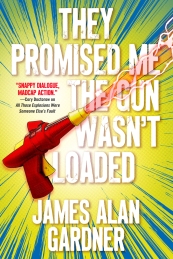This is another post in The Skill List Project: an attempt to list all the skills involved in writing and selling fiction, particularly science fiction and fantasy. Last time around, we talked about Reading Voraciously. This time around, we’ll look at reading judiciously: the skill of reading in order to learn from other writers.
Reading Like a Writer
In an essay in About Writing, Samuel R. Delany offers a list of observations containing the following (p. 127):
5. It is almost impossible to write a novel any better than the best novel you’ve read in the three to six months before you began writing your own. Thus you must read excellent novels regularly.
6. Excellent novels set the standards for our own. But bad novels and bad prose are what teach us to write—by setting strong negative examples. You must read both, then—and read them analytically and discriminatingly.
As writers, we have to develop the skill of reading with doublethink—reading for enjoyment, but also reading in order to dissect, learn, and occasionally steal. We have to do both simultaneously. If we just enjoy, we miss the chance to figure out how the writer provides the enjoyment; if we just dissect, we become one of those irritating people who watches magic tricks solely to solve how the trick is done, thereby missing the magic. Such people may succeed in extracting formulas and techniques, but they blind themselves to the art…and the heart.
Paying Attention
So how do you learn to read like a writer? For me, it’s a matter of paying attention to the actual words on the page, not just the ideas and images that the words convey. For example, get a book that you think is particularly good and look at the opening page. What’s so good about it? What does the author do that grabs you? What are the exact words that create mood, establish setting, introduce characters, and whatever else the author is doing? Why do these particular words work? Are the sentences long or short? Is the vocabulary complex or simple?
Read the passage several times. What stands out? What grabs your attention? What resonates? What flows?
When we’re reading purely for enjoyment, we tend to zoom along without awareness of word choice, sentence construction, and paragraphing. We also zoom past important structural details like chapter breaks, sections within chapters, and authorial insertions. (I use the term “authorial insertion” for any inserted tidbit that’s outside the actual narrative. For example, chapter titles are insertions—real life doesn’t come with headings. Some books also put the date/time at the beginning of each chapter, or the name of the viewpoint character. Insertions may also include quotations or other interpolated material placed at the start of chapters and/or sections.)
To read like a writer, you have to ask, “What is the author doing here, and how does it affect the reading experience?” In a story that works, how does the author make it work? And in a story that doesn’t work, what does the author do wrong?
As Delany noted, reading bad prose can be illuminating. Get a book you didn’t enjoy and read a few pages several times. What’s wrong with the writing? Are there words that stand out as inappropriate? Is the flow confusing? Does the rhythm of the prose trip over itself? Is something wrong with the plot or the action? Do the characters seem unbelievable…and why? (And why does it matter? Lots of effective writing contains unbelievable characters. You’ll never meet someone as smart as Sherlock Holmes, as evil as Hannibal Lecter, as ultra-competent as Batman—but we can still love reading about them. Why do such characters work despite, or because of, their unbelievability?)
By reading bad books, we learn what fails and what we have to avoid. By reading good books, we learn how high we ought to set the bar. Both sides of the coin can inspire us. We yearn to be as good as the best; we look at the worst and say (in Spider Robinson’s immortal words), “By Jesus, I can write better than this turnip.”
But How Do You Actually DO It?
How do you dissect a passage of prose and learn from it? At the risk of falling flat on my face, next time I intend to take a sample of writing—preferably something out of copyright—and I’ll try to show how I would read it to learn something about writing. If anyone can think of a passage I should look at, by all means suggest it in the comments.
In the meantime, if you have helpful stories about learning from good or bad writing, please share them with us in the comment section. (Every writer in the world needs inspiration!)
